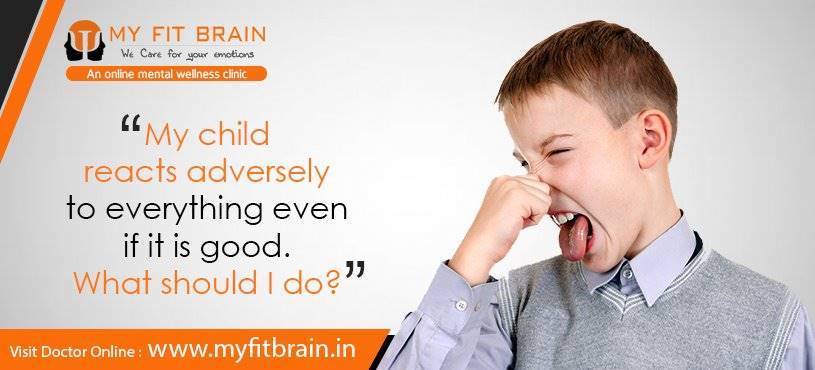Package of 5 Sessions
- Rs.5,999.00/-
Guiding and Discipling young children are a complex business that takes skill and focused efforts. Connect to our Expert Child Psychologist/ Counselor
 Rahul Kaushik
Rahul Kaushik  24 Sep 2017
24 Sep 2017  Child Behaviour
Child Behaviour  3.8k Reads
3.8k Reads  6 min Read
6 min Read 
There are some child behavior problems that are common at one point but there are also many serious problems that require the help of professionals. The way how the parents respond plays a major role in how your child can replicate behavior problems in the future.
If you want to understand the common behavioral issues that the children experience then you should understand the child's behavior. A child's behavior is considered normal if it is appropriate in a social, developmental, and cultural way. But a child's behavior is considered harmful and not age-appropriate even if they don't meet social or cultural expectations only.

It is common for children to have some arguments, and shout once but it becomes a cause for concern if this behavior becomes a daily occurrence. The following are some signs that suggest your child is facing behavioral issues:
_1610705770.jpg)
Sometimes, abnormal behavior can be a symptom of a behavior disorder that requires the attention of a medical practitioner. the following are some common behavioral disorders in children:
Oppositional Defiant Disorder is disruptive behavior that usually affects children. The following are the symptoms of this disorder:
Children who face conduct disorder are known for their inappropriate behavior and not following the rules. The following are the symptoms of this disorder:
It is related to conduct disorder and common features of the disorder are hyperactivity problems related to attention, impulsive behavior in children, etc. The following are the symptoms of this disorder:
There are different types of learning disabilities that affect a child's academic performance and require the help of specialized teachers. The following are the symptoms of this disorder:
A child suffering from this disorder may be indifferent to other problems and this disorder increases in later stages of life.
This is usually a result of social interaction impairment and in this disorder, children face difficulty in initiating conversation in public and casual conversations. You can identify these unusual behaviors in your child but these disorders become more visible as the child grows up.
The main causes of ODD, CD and ADHD are not known but the following are some risk factors:
Gender: It is not clear whether the cause is genetic or linked to experiences of socialization but boys suffer more from behavioral disorders than girls.
Gestation and birth: Difficulty in pregnancies, premature birth, and low weight at the time of birth can also contribute to the child’s problem behavior later in life.
Temperament: Children develop behavioral disorders later in life who are aggressive from an early age and are difficult to manage.
Family life: Behavioral disorders are more likely in families where domestic violence, poverty, poor parenting skills, or substance abuse are a problem.
Learning difficulties: Learning difficulties such as reading and writing problems are often associated with behavior problems.
Intellectual disabilities: Behavioral disorders are more likely in children with intellectual disabilities.
Brain development: The areas of the brain that control attention is noted to be less active in children with ADHD.
Disruptive behavioral disorders are complex and may involve many different factors such as ADHD, anxiety, depression, and difficult home life.
The following are the diagnosis methods:
Acute stresses can disrupt a child's behavior and so it is important to control these. For example, an ill parent may be responsible for a sudden change in the child's normal behavior and these factors need to be considered initially.

Treatment is usually multifactorial and depends on the particular disorder and factors that contribute to it, and include the following:
Parental education: Teaching parents how to communicate with and manage their children in this disorder.
Family therapy: The whole family is helped to improve communication and problem solving skills.
Cognitive-behavioral therapy: This therapy helps the children to control their thoughts and behavior.
Anger management: Children are taught to recognize the signs of their growing frustration and also taught relaxation techniques and stress management skills to cope with this.
Encouragement: Some children with behavioral disorders experience repetition of failures at school and encouraging the child can help build self-esteem.
At last, I can say that these problems such as defiant disorder (ODD), conduct disorder (CD), and attention deficit hyperactivity disorder (ADHD) can occur as a result of temporary stresses in the child's life.
Behavioral disorders in children can cause stress and frustration for the whole family. This increases fighting, destructiveness, and disobedience in children, and they move from one task to another without completing the first.
_1768192276.jpg)

Stress does not always arrive with noise. Sometimes it comes quietly. It si...
 12 Jan 2026
12 Jan 2026  6 min Read
6 min Read 310 Reads
310 Reads _1767765311.jpg)

There is a very specific moment every day that most couples underestimate. ...
 07 Jan 2026
07 Jan 2026  6 min Read
6 min Read 455 Reads
455 Reads _1767610041.jpg)

Many relationships suffer stress, not due to a lack of love or lack of affe...
 05 Jan 2026
05 Jan 2026  6 min Read
6 min Read 423 Reads
423 Reads _1767342715.jpg)

In almost every relationship. If it's between spouses or family members...
 02 Jan 2026
02 Jan 2026  6 min Read
6 min Read 426 Reads
426 Reads 
_1768192276.jpg)
_1767765311.jpg)
_1767610041.jpg)
_1768192276.jpg)
_1767765311.jpg)
_1767610041.jpg)
_1767342715.jpg)